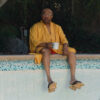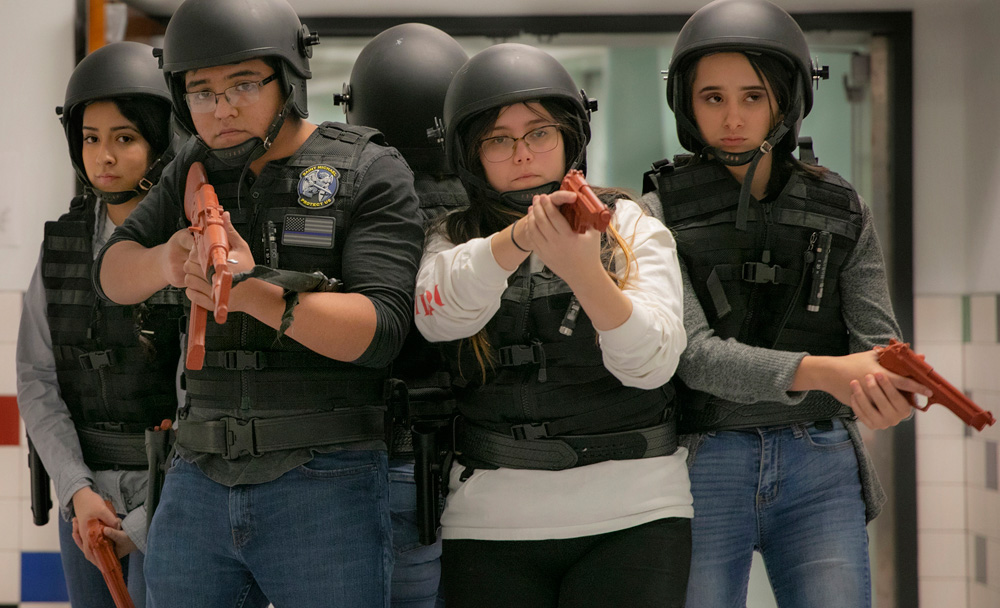There’s a full day of events for the high schoolers attending the Border Challenge in Texas, a veritable gauntlet that includes an active shooter drill and a drug raid for which the teens at Horizon High that Maisie Crow follows for “At the Ready” are outfitted in full paramilitary regalia. The film informs that over 900 high schools in America offer law enforcement classes, but at Horizon, located just 10 miles from the border in El Paso, they are of particular interest when the greatest opportunity for a well-paying job in the area exists in some kind of law enforcement, whether it is a position in ICE, customs, one of the branches of the military or the local police. It may be jarring at first to see students so young trying to calm down victims of trauma in a simulation or carrying weapons, prepared to bust a door down, but in a society where bringing the young into such situations is increasingly normalized, the shock value may lie more in Crow pulling back to highlight an equally surprising and fundamental juxtaposition that these kids, almost exclusively Hispanic, are being groomed to enforce a system that had they been born just a few years later would prevent them from entering the country as well.
These striking dichotomies all make for a fascinating year in the lives of Cristina, Mason (known in the film as Kassy) and Cesar, who each see their participation in Horizon High’s Criminal Justice Club as more than an extracurricular, but rather the path to a full-fledged career when football games at Horizon aren’t necessarily an opportunity to blow off steam on a Friday night and hang out with friends, but a chance to learn how to patrol a perimeter when it’s up to these students to investigate under-the-bleacher activity and the process of becoming president of the Criminal Justice Club is akin to a job interview, with teachers convened as if they were a police board. However, Crow, a native Texan brought back to the state after knowing of rising tensions at the border, finds a fortuitous moment in which the teens may start questioning their dream occupation — or perhaps push them further towards it — when such ethically murky border enforcement practices such as child separation and the inspiring Senate run of local politician Beto O’Rourke change their ideas of who they should be and what they can accomplish.
Crow, who with her husband Max Kabat moved back to Marfa to take over the local newspaper The Big Bend Sentinel around the time of conceiving her latest documentary, clearly knows a thing or two about the strength of traditions in Texas and the gentle persistence required to change them when necessary, and “At the Ready” shines a light on concerning issues of education, military fetishization and immigration that raise questions in such a way they can be considered in a more nuanced way. With the film’s premiere at the Sundance Film Festival, the filmmaker (and editor-in-chief) spoke about the lessons to be learned at Horizon High and being their at such a pivotal point in the lives of her subjects and the country.
What got you interested in making this?
I was ready to come home and I was ready to tell stories from the perspective of Texans, in particular because of the rhetoric that Trump had been using during the campaign, so I was interested in looking at the coming years through the eyes of high school students because those are some of the most formative years in one’s life and I wanted to know how things were playing out in the national media were shaping young minds.
I was struck the first time I saw the training program and I was interested in learning more. It was a combination of both wanting to look at what was happening around the country through the eyes of high school students on the border, and also learning about these programs and really how and why students were studying and training to go into law enforcement in high school. I was looking for compelling stories and meeting students that were open and willing to share their hopes, their dreams, their disappointments, and their frustrations, and really talk about that openly and on camera and be okay with sharing that. Making a film like this, you’re really asking someone to be very vulnerable and that’s a hard thing for many people to do, so I really commend these students for willing to go there with me. Once they all saw the film, I think they really felt like their stories were told in the way that they were hoping they’d be shared with the world.
When you first get on the ground there, was there anything that upended your own expectations?
I live really close to El Paso, so I know the region very well, but I think I’m always open to surprises. I always go into making a film, knowing that I need to go with the flow of what’s happening and I’m not going to force anything just to fit a certain narrative. Part of the beauty of documentary film and verite in particular is that you get to go on a journey with the people you’re filming and you don’t necessarily know the end results.
It seems like it might’ve been a different process than you’re typically accustomed to when you’re covering a high school. Was it any different getting those one-on-one relationships?
I did go into school in the mindset of [thinking] “Okay, I’m going to develop some deep relationships with a few students, so I was constantly trying to find and make sure I was following the students who ultimately became the three main characters in the film.” It didn’t take too long to really zero in on the three of them and get to know them really very well, and I think that’s just how I make film is that I really love to understand the experience someone’s having and really try and view it through their eyes.
I was fascinated to learn that you started running a newspaper during this time as well, and it made me wonder, was it interesting seeing how these kids were getting their news when their career goals aligned so closely to what was happening?
Yeah. I’ve never thought about it from that perspective, but one student in particular got their news from their phone all the time and could really sort what they were receiving, and then another, I feel like got the majority of his news from class discussions and what was being shown in the school. I don’t think I ever saw any of them ever pick up a newspaper, and the newspaper that we have is still a print edition. People come every Thursday morning to the Sentinel to pick up their newspaper or they get it delivered to their PO box, so the way people consume news greatly varies by generation more so than anything else at this point, because almost everybody has a phone, and you’re able to connect to what you want to see.
At least it was heartening to see everyone so engaged. Was the election cycle something you knew would be such a big part of the film from the start?
I don’t think I ever was able to necessarily anticipate until I was in that moment how a large news event was going to impact each individual, and I did not expect the mid-term elections to have as big of an impact on Christina as they did. Selfishly, I was really excited to see Beto the night that I thought he was going to win the election, and I don’t think I was alone in thinking that. Honestly, that was one of the most soul crushing emotional nights making this film, not because he lost or for me personally, but because of what I had to witness Christina going through. She really put so much stake in him winning and what that meant and what he symbolized. And when he lost, I felt like I in an instant, watched someone going from being a teenager to becoming an adult and realizing that they were going to have to grapple with some hard decisions as they entered the career field that they wanted to pursue.
You alluded to it at the beginning, but I understand that you set up a screening for the subjects over the holidays. What was it like to show them the film?
Usually, I screen a film or any of my long-term [projects] with the people that it features in person, so that was very disappointing for me that I wasn’t going to get to do that, but I set up individual Zooms with each of the three students and with the four teachers in the film and watched it one by one. I have now seen it so many times [myself], but being able to watch it on Zoom and pause and talk and see their reactions and be able to answer any questions they may have, I always find that’s the standard I want to hold myself to — that every person in this film going to feel like they were represented accurately. If I can achieve that, then I feel like I’ve done something right. I always hold that in my mind when I’m making a film, what’s going to be the reaction of the person seeing it, and maybe they’re going to have to see some hard moments, but as long as we can both agree that that’s what happened, then it’s going to work for all of us.
“At the Ready” will open on October 22nd in theaters and on VOD.




